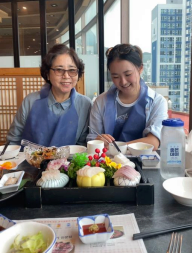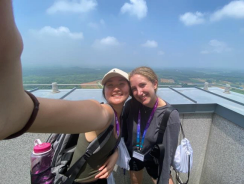The Taboo Narrative of my Homeland – Taking off the rose-tinted glasses
Sitting in the slightly dusty, but arguably cozy small room in the brick-and-mortar side building of South Korea’s National Hospital, I awkwardly tried to look at confident as possible.
As part of my internship with Saejowi, an NGO based in Seoul, South Korea dedicated to the resettlement and medical support of North Korean defectors across the country, and my Wharton Social Impact and Research Experience, I was visiting one of Saejowi’s five medical advising clinics to speak with North Korean defectors on the difficulties they faced assimilating to South Korea’s highly capitalist and modern culture. I had some of the most heartfelt conversations in that room, learning about the constant heartache felt by defectors who often left family members in their escape, the persistent prejudice they experienced from their surrounding South Korean communities, and even a mother’s grief as she celebrated her daughter’s 19th birthday from across the border.

my paternal grandparents for the first time in four years, visiting the beaches along the peninsula
and eating sushi.
As a first-generation Korean immigrant growing up in America, I’ve always had a complicated relationships with reconciling my South Korea culture alongside my American one. Yet, to further complicate this relationship was the portrayal of North Korea and the North Korean citizens in my American history classes and the seemingly ignorance of the issue among my Korean relatives. As a prospective law student interested in practicing international human rights law, this summer I sought out an opportunity to understand a human rights crisis that directly impacted my culture and my ethnic people. At Saejowi, I served as an External Relations and Research intern, helping to renovate the English version of their organization website and compile letters written by North Korean refugees to consolidate for publication. I learned about both the linguistic and medical barriers faced by North Koreans, including an ignorance of mental health issues and deeply rooted trauma and anxiety. I even had the opportunity to visit Hanawon, the rehabilitation center coordinated by the South Korean government to house, teach, and rehabilitate North Koreans in their first three months after successful defection.
I’ve been able to reflect on both a personal and professional challenge to bring back from my incredible seven weeks in South Korea. Firstly, I have been shown once again how privileged I am to be attending school and have a plate of food on my table every night. Reading North Korean letters about their difficulties and desire to even have one warm bowl of white rice left me crying silently at my internship office multiple days each week and meeting North Koreans so envious of my opportunities in America have helped put my everyday experiences into perspective. Additionally, I learned about the progressiveness and magnitude of the South Korean refugee support to North Koreans, from highly subsidized medical bills to free housing and multiple lump sums of cash. It reinvigorated my passion for working with immigration and devising new professional strategies to support displaced persons.




